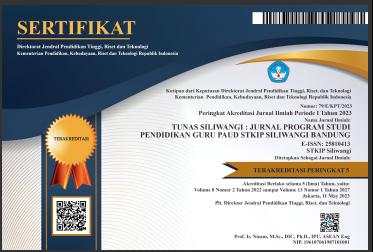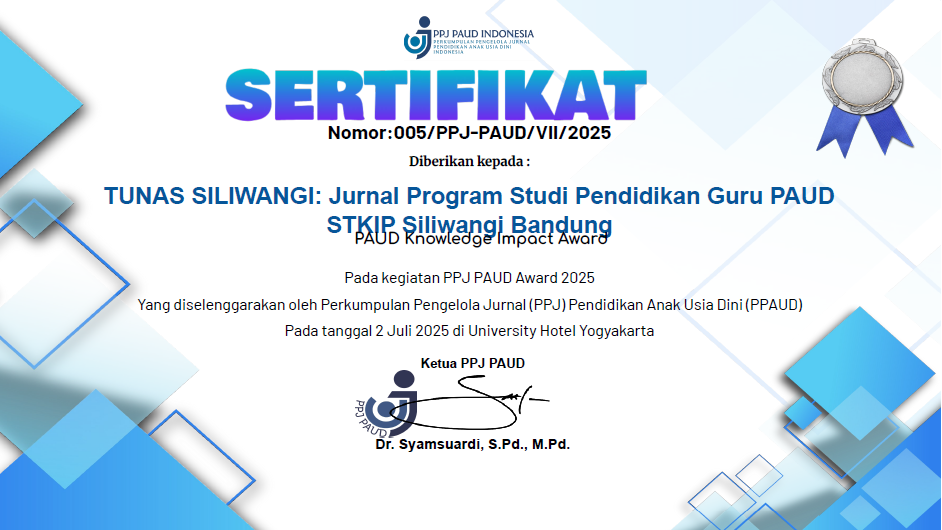Addressing educational disparities: the role of policy in expanding early childhood education access in 3T areas
DOI:
https://doi.org/10.22460/ts.v10i2.4999Keywords:
Policy, Early childhood, Acces AreaAbstract
Poor health can hinder a child''s overall development. Inadequate stimulation at home: Many children do not receive enough cognitive stimulation and emotional support in their early years, which are critical for brain growth and learning. The research method used in this article is a literature study by collecting books, journal articles, research reports, and other sources relevant to the topic of The Role of Policy in Building Equitable Access to Early Childhood Education. There are many ways that the budget for ECE operations can be used to improve early childhood education, such as: 1) Improved Facilities and Infrastructure: With sufficient budget, ECE institutions can repair and upgrade their physical facilities that support learning, such as libraries, playgrounds, and classrooms. 2) Improving the Quality of Educators: To improve the quality of teaching and learning in ECE, an adequate budget can be used for training and development of ECE teachers to meet teacher competency standards. This will have a positive impact on the quality of teaching and learning in ECE. 3) Curriculum Development and Learning 4) Procurement of Teaching Materials and Learning Media: You can use the budget to purchase high-quality teaching materials and learning media It is important that action is taken by the government to address disparities in access to education in disadvantaged, frontier and outermost (3T) areas
References
Aslanian, T. K. (2020). “Remove ‘care’and stir: Modernizing early childhood teacher education in Norway.” Journal of Education Policy 35, 4, 485–502. https://doi.org/10.1080/02680939.2018.1555648
Bergh, A. (2015). Local quality work in an age of accountability – between autonomy and control. Journal of Education Policy, 30(4), 590–607. https://doi.org/10.1080/02680939.2015.1017612
Britto, P. R., Yoshikawa, H., & Boller, K. (2011). Quality of Early Childhood Development Programs in Global Contexts: Rationale for Investment, Conceptual Framework and Implications for Equity. Social Policy Report. Volume 25, Number 2. Society for Research in Child Development, 25(2), 2011. https://eric.ed.gov/?id=ED519240
Brooks, L. E., Kotzé, J., Almeleh, C., & Senona, E. (2022). Assessing the policy options for the public provisioning of early childhood development programmes. South African Journal on Human Rights 38, 3(4), 240–260. https://doi.org/10.1080/02587203.2022.2149614
Brown, M. R., Chavarria, M. M., & Morris, P. (2024). Identifying Policy Flaws: Addressing Educational Inequities in Early Childhood Education for Young Black Children. In In Advancing Equity and Inclusion in Early Childhood Education. IGI Global. https://doi.org/10.4018/979-8-3693-0924-7.ch003
Damayanti, W. K., Trisnamansyah, S., Khoeriyah, D., & Koswara, N. (2022). Operational Assistance Policy in Improving The Quality of Early Childhood Education. Indonesian Journal Of Educational Research and Review, 5(3), 524–534. https://doi.org/10.23887/ijerr.v5i3.52558
Deuchar, A. (2024). International education policy and/as the limits of humanism: A posthuman critique from the Anthropocene. Journal of Education Policy, 39(5), 755–774. https://doi.org/10.1080/02680939.2023.2245793
Elviana, I., & Fadhly, Z. (2021). Peran Dinas Pendidikan dalam Mengimplementasikan Kebijakan Pendidikan Anak Usia Dini di Kabupaten Nagan Raya. Journal of Social and Policy Issues, 2, 42–48. https://doi.org/10.58835/jspi.v1i2.15
Ertz, M., Kupaei, H. R., Rad, D., Rede¸s, A. R., Roman, A., Ignat, S., Lile, R., Demeter, E., Eger˘ Au, A., Dughi, T., Bala¸s, E. B., Maier, R., Kiss, C., Torkos, H., & Rad, G. (2022). Pathways to inclusive and equitable quality early childhood education for achieving SDGG goal-a scoping review. Frontiers in Psychology, 1–18. https://doi.org/10.3389/fpsyg.2022.955833
Gunter, H., Hall, D., & Mills, C. (2015). Consultants, consultancy and consultocracy in education policymaking in England. Journal of Education Policy, 30(4), 518–539. https://doi.org/10.1080/02680939.2014.963163
Hong, X., Liu, P., Ma, Q., & Luo, X. (2015). The way to early childhood education equity - policies to tackle the urban-rural disparities in China. International Journal of Child Care and Education Policy, 9(1). https://doi.org/10.1186/s40723-015-0008-9
Istiqomah, L. (2017). Tiga Pilar Kebijakan Pemerintah Dalam Pembinaan Paud. Golden Age: Jurnal Ilmiah Tumbuh Kembang Anak Usia Dini, 1(2), 57–66. https://doi.org/10.14421/jga.2016.12-05
Neuman, M. J., & Okeng’o, L. (2019). Early childhood policies in low- and middle-income countries. Early Years An International Research Journal, 39(3), 223–228. https://doi.org/10.1080/09575146.2019.1636571
Rao, N., Umayahara, M., Yang, Y., & Ranganathan, N. (2021). Ensuring access, equity and quality in early childhood education in Bangladesh, China, India and Myanmar: Challenges for nations in a populous economic corridor. International Journal of Educational Development 82, 82. https://doi.org/10.1016/j.ijedudev.2021.102380
Semaun, F. (2019). Analisis Penerapan Tiga Pilar Kebijakan Pemerintah Dalam Pembinaan Pendidikan Anak Usia Dini. DUNIA ANAK : Jurnal Pendidikan Anak Usia Dini, 1(2), 21–32. https://doi.org/10.31932/jpaud.v1i2.385
Sulasmi, E., Prasetia, I., & Rahman, A. A. (2023). Government Policy Regarding Education Budget on The Posture of The State Budget (APBN). Journal for Lesson and Learning Studies, 6(1), 142–151. https://doi.org/10.23887/jlls.v6i1.60171
Ulfiaturrohmah, N., Hargianti, N. A., & Diantoro, F. (2021). Peran Tri Pusat Pendidikan Dalam Menghadapi Problematika Pembelajaran Daring Di Daerah 3t. Jurnal Pendidikan Dan Pemikiran Islam, 4(2). http://e-journal.stit-islamic-village.ac.id/index.php/istighna
Waruwu, M. (2023). Pendekatan Penelitian Pendidikan: Metode Penelitian Kualitatif, Metode Penelitian Kuantitatif dan Metode Penelitian Kombinasi (Mixed Method). Jurnal Pendidikan Tambusai, 7(1), 2896–2910. https://doi.org/10.36706/jbti.v9i2.18333
Wright, T. S. (2011). Countering the politics of class, race, gender, and geography in early childhood education. Educational Policy, 25(1), 240–261. https://doi.org/10.1177/0895904810387414
Yang, H., Rao, N., & Pearson, E. (2024). Inequality in access to early childhood care and education programs among 3-to 4-year-olds: Trends and variations across low-and middle-income countries. Early Childhood Research Quarterly, 66, 234–244. https://doi.org/10.1016/j.ecresq.2023.10.013
Downloads
Published
Issue
Section
License
Copyright (c) 2025 Putri Indah Sari, Rudiyanto Rudiyanto, Mubiar Agustin

This work is licensed under a Creative Commons Attribution-ShareAlike 4.0 International License.
The author is responsible for acquiring the permission(s) to reproduce any copyrighted figures, tables, data, or text that are being used in the submitted paper. Authors should note that text quotations of more than 250 words from a published or copyrighted work will require grant of permission from the original publisher to reprint. The written permission letter(s) must be submitted together with the manuscript.







